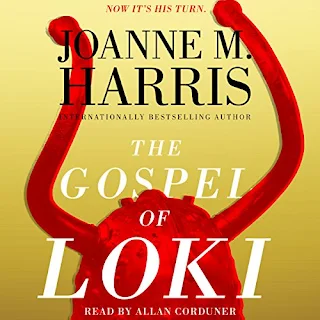I’ve gone through the Norse myths a few times now, including Neil Gaiman’s far-more-famous
Norse Myths, and I have to say this has been my favorite retelling. Vastly preferred. Gaiman’s a wonderful writer, but he delights so in shock value that he seems to leave out these elements that make monsters more human (including Thor, who is a psychopathic brute in his stories).
Harris, on the other hand, adds elements here and there that make Loki’s actions suddenly make far more sense.
Loki doesn’t dwell--far less than I would—but seems to merely shrug these triggers off, for the most part, in the moment.
But when he retaliates, you understand better why he does, maybe even better than Loki does himself—after all, Loki identifies as the quintessential ‘bad boy’, really.
For example, I’d never put together that Loki’s son Fenris Wolf was tricked by the other gods and bound eternally shortly before Loki had Balder, Odin’s golden son, killed.
I am not sure if that’s always the sequence it’s written in, but this was the first time I’d even made that causal association.
It seems obvious now, and somehow Harris managed to convey that association even though Loki seemed to shrug off Fenris’s fate and declare once again how unpaternal he is.
Truly, I was delighted by The
Gospel of Loki audiobook, which was not at all what I expected. A few years ago I had enjoyed Runemarks, and this was ‘in that series’,
so I delayed listening to it because I wanted to first refresh myself on Runemarks. I finally, however, just put on this
audiobook, which turned out to be only a distantly-related novel; Odin was a
character in Runemarks, but that is
an entirely fictional story based around an odd girl living in a village. The
Gospel of Loki, however, is an epic retelling of the Norse myths from Loki’s
perspective, and the girl is not part of the story at all.
I believe Joanne Harris may have added some
major origin elements of her own creation—such as that Odin pulled Loki’s
human-form manifestation from his wildfire aspect in chaos, which had previously
served the Lord of Chaos—but such additions served to make imminent sense of
Loki’s story and remained consistent with known elements of the stories, which
have only come down to us in part. I
tend to think she may have tapped into some of the original myths, it makes so
much sense! Also, Joanne Harris somehow,
magically, manages to maintain Loki’s witty, persuasive voice throughout this
entire novel, which must have been quite a feat. Only once did I feel that she slipped just
slightly in keeping up Loki’s voice, and that could be... godly error/variation?
Loki is such a charming, brilliant character that you find
yourself sympathetic even when you know he’s guilty as sin—or chaos, as that
may be. He suffered so much at being
punished, and you hate to see it, and it sort of reinforces the fruitlessness
of punishment, per se, beyond the
mere practicality of preventing further crimes.
Especially in Loki’s case, as Joanne Harris subtly delivers the message
that Loki’s mistreatment/punishments are what bring them all to Ragnarok. He is brilliant, after all, and the
punishments make him desperate.
On a personal authorial note, my two as-yet-unpublished YA
Fantasy manuscripts-in-progress are linked to aspects of Norse mythology, but I’ve as yet never so much as mentioned the Trickster (Loki) at all. After this magnificent
retelling, I wouldn’t be surprised if he inserts himself into any future
manuscripts in my own series, thanks to Joanne Harris’s amazing storytelling! I already liked her writing, but she has just
gone up several notches in my list of favorite authors. By the way, the narrator, Allan Corduner, was
absolutely fantastic as well, and I highly recommend the audiobook version.

No comments:
Post a Comment